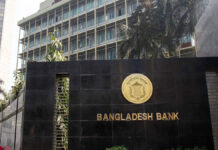South Asia set to plunge in worst-ever recession due to Covid-19 fallout, it warns

The World Bank, in a report today, has estimated that Bangladesh will do better than its South Asian neighbours in GDP growth for the fiscal year 2019-20.
The report based on the latest course of development of South Asian economy was revealed ahead of a virtual annual meeting held from WB headquarters in Washington, USA this morning.
In FY2019-20, Bangladesh’s GDP growth is estimated to be two percent, according to WB. The data published by Bangladesh Bureau of Statistics in August said it will be 5.2 percent.
On the other hand, in FY2020-21, Bangladesh’s GDP growth will be 1.6 percent, forecasted WB.
The WB report said South Asia is set to plunge into its worst-ever recession as the devastating impacts of Covid-19 on the region’s economies linger on, taking a disproportionate toll on informal workers and pushing millions into extreme poverty.
India’s economy, the region’s largest, is expected to contract by 9.6 percent in the fiscal year that started in March 2020.
Regional growth is projected to rebound to 4.5 percent in 2021.
Factoring in population growth, however, income-per-capita in the region will remain 6 percent below 2019 estimates, indicating that the expected rebound will not offset the lasting economic damage caused by the pandemic.
In previous recessions, falling investment and exports led the downturn. This time is different, as private consumption, traditionally the backbone of demand in South Asia and a core indicator of economic welfare, will decline by more than 10 percent, further spiking poverty rates.
A decline in remittances is also expected to accelerate loss of livelihoods for the poorest in some countries.
“The collapse of South Asian economies during Covid-19 has been more brutal than anticipated, worst of all for small businesses and informal workers who suffer sudden job losses and vanishing wages,” said Hartwig Schafer, World Bank Vice President for the South Asia Region.
“Immediate relief has dulled the impacts of the pandemic, but governments need to address the deep-seated vulnerabilities of their informal sectors through smart policies, and allocate their scarce resources wisely.”
Three-quarters of all workers in South Asia depend on informal employment, especially in hospitality, retail trade, and transport — sectors most affected by containment measures.
Few informal workers are covered by social insurance, have savings or access to finance. The report urges governments to design universal social protection as well as policies that support greater productivity, skills development, and human capital.
In that effort, securing international and domestic financing will help governments fund crucial programmes to speed up recovery.
In the long-term, digital technologies can play an essential role in creating new opportunities for informal workers, making South Asia more competitive and better integrated into markets — if countries improve digital access and support workers to take advantage of online platforms.
“Covid-19 will profoundly transform South Asia for years to come and leave lasting scars in its economies. But there is a silver lining toward resilient recovery: the pandemic could spur innovations that improve South Asia’s future participation in global value chains, as its comparative advantage in tech services and niche tourism will likely be in higher demand as the global economy becomes more digital,” said Hans Timmer, World Bank Chief Economist for the South Asia Region.









